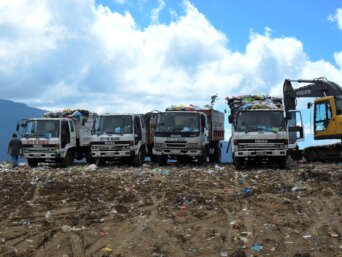- About
- Topics
- Story
- In-Depth
- Picks
- Opinion
- News
- Donate
- Signup for our newsletterOur Editors' Best Picks.Send
Read, Debate: Engage.
| topic: | Climate action |
|---|---|
| located: | Bosnia and Herzegovina, Italy |
| editor: | Katarina Panić |
When trucks started dumping waste from Italy in the area of two small municipalities in southwestern Bosnia at the beginning of this month, the citizens became upset. They started asking what is going on, and it seems authorities hadn't heard their question well. So, they had to choose the language the decision-makers are going to understand better – roadblocks and protests – and it worked.
According to a Federal Ministry of Environment and Tourism announcement, what was dumped was supposed to be raw materials for production, but instead, textile waste, wood, sand or some other material was stored in Drvar and Bosansko Grahovo.
According to local media, "some other material" is actually hazardous waste from Italy which faced safe disposal difficulties because of a number of COVID-19 cases.
"Bloody sheets, used masks and protective suits, spent cartridges – all packed in bales and loaded on trucks, with delivery notes that read 'recycling waste', ended up in devastated, deserted factories," the newspapers Blic reports.
It was revealed that the Ministry granted the company Krom reciklaža the importation of non-hazardous waste from Italy on March 16, the very same date the state of natural disaster in the Federation of Bosnia and Herzegovina was declared. The company is owned by three individuals from neighbouring Serbia. They established it with some 200 Euro founding capital each. Its address is Titova Street 1 – the very same as the Municipality of Drvar.
The import of waste is not allowed in Bosnia, unless it is specifically for recycling. However, the importer has not proved so far where the waste is planned on being processed. Some 300 tons are stored currently in abandoned factories that have not been operating since the communist era.
The Federal Ministry of Environment and Tourism revoked the permission for the import of non-hazardous waste from Krom reciklaža and ordered its return to Italy. The Federal Urban-Environmental Inspection established the lack of an environmentally friendly manner and supervision as well.
For the umpteenth time, the media did the job instead of the police and the prosecution. And again, they pay the price. For the very first time, authorities decided imported waste has to be returned to the country of origin. No matter how small and poor the area is, it looks like direct activism paid off.
Image by PublicDomainPictures
